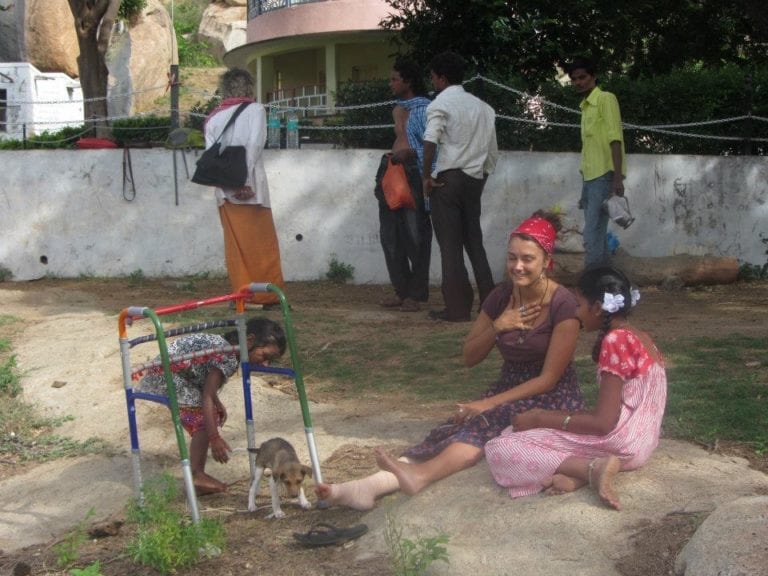
Please note: What follows is a personal narrative of the writer’s experience taking collagen. No statements have been evaluated by a doctor, and while you can trust that the anecdotes are true, this is not meant to supplant medical advice. If you have CRPS or another autoimmune disease, collagen may be right for you—but be sure to speak with your doctor first.
When I flipped over the handlebars in very rural India, the world didn’t slow down. There wasn’t a pause in the time-space continuum, portending the massive impact this singular moment would have on my life. My husband ran over to lift my pant leg and confirm—his face grim and nearly green—that yes, there was no doubt I’d badly broken my right leg. I took an agonizing rickshaw ride to the first clinic, where they confirmed they would not be able to do the necessary operation, and then another excruciating 12-hour cab ride to a hospital in Bangalore. By the time I had surgery, it had been 24 hours since the accident.
I healed—in India—and trekked through the Shan Mountains of Myanmar six months later. My leg, however, was never the same. It occasionally would become inflamed, for no apparent reason, or bruised in weird places.
After too many doctors visits to count, two years later, I was finally diagnosed with Type 2 Complex Regional Pain Syndrome (CRPS). The condition is progressive and incurable. It wouldn’t be a huge problem in my life providing I didn’t injure my other leg (the condition often spreads to mirrored limbs).
And then another accident occurred. Last summer, someone fell into me on a dancefloor, tearing all four ligaments in my left knee. I had ACL and meniscus reconstruction last November—about the same time my left leg began to exhibit CRPS symptoms. Doctors loaded me up with prescriptions meant to numb my nerves (Gabapentin), and pills intended to dull the pain (Oxy). I never filled the oxy prescription, and I flushed the Gabapentin after experiencing a burning sensation in my feet. The emotional effects of chronic pain are real. I was a mess.
In March, at Wanderlust O’ahu, someone handed me a sample packet of Vital Proteins collagen powder. As significant of an impact that those tiny moments of my motorcycle accident had on my life, this singular moment became second. I thought, „Hey, what could I lose from regularly taking collagen?“ So I gave it a shot—and thus honestly, truly, though cliché as it may sound, changed my life.
What follows is an informal diary of what happened when I began taking collagen regularly.

Month 1: Shinier Skin
After returning from Hawaii, I bought a large container of Collagen Peptides powder and began experimenting. I mostly put it in smoothies—one scoopful every morning. The first thing I noticed was my skin. I’m 34 years old, and certainly starting to see the lines of happy living around the corners of my eyes and across my forehead. I have oily skin, and haven’t ever been too concerned with my skin aging; though when I started taking collagen everyday, I began to notice a difference.
My eyes were less dark underneath (despite a demanding job and New York City living), and my husband commented (more than once!) on a certain new sheen to my cheeks. I thought I started to feel better in my legs, but CRPS isn’t constant, so it was difficult to tell. I’m also a bit of a skeptic, so didn’t want to get ahead of myself.
Month 2: Symptoms Fade
One of the symptoms I get often with CRPS is the pooling of synovial fluid near a nail mark on my right knee. I’m not a doctor—and, to be honest, most of my doctors admit that these kinds of autoimmune diseases are still largely mysterious to the medical community—but the way I understand it, simply, is that my brain thinks there’s something wrong with my knee. When I get stressed or overwork my leg, it tries to fix it, resulting in an increase of synovial fluid that then leaks out through that nail scar in my leg (gross, I know…).
The relationship between collagen and synovial fluid is most often understood when examining arthritic patients: When there’s not enough collagen in the knee, there’s sometimes an imbalance of synovial fluid, making it difficult and painful to walk. When I started taking collagen regularly, that lump (again, presumably of synovial fluid), began to decrease. This could be coincidental, but I noticed it in the fifth week of my three-month experiment.
It’s not exactly that the pain symptoms of my CRPS were disappearing—but I certainly noticed it less. My right knee felt stronger than it had in years. It was in the second month of taking collagen that I did my first Camel Pose in six years; and didn’t want to vomit from the pain of putting weight on my right knee.
Month 3: Strengthening of Ligaments After Surgery
As the summer started and I approached the year anniversary of tearing my ACL, meniscus, PCL, and MCL, I vowed that come Labor Day I’d have my left leg back in action as well. This surgery is, to be transparent, no joke. I spent six months in physical therapy to rehabilitate, and while my range of motion was registering normally, my left knee was still significantly achy and sore. By the third month of regularly taking collagen, this was starting to change. I took note of greater mobility in not just my knee joint, but my leg as a whole. My hamstring began to feel more stretchable without feeling pulled, and one day, I realized it’d been several weeks since I’d felt acute pain shooting through the back of my knee.
I’m a yoga teacher, and so am pretty tuned into what’s happening in my body. It’s not as if the pain is entirely vanished from my left leg, but it’s certainly different than it was when I started my collagen journey back in March.
Bottom line? I’m not a doctor, a beautician, or a physical therapist. But I personally experienced healing and symptom relief when I started a regular collagen regimen that I didn’t from years of prescription medication. Even if all CRPS symptoms disappear completely, what’s not to love about beautiful skin? I’m now a devout collagen believer—and you’ll never find my pantry devoid of a jar of Vital Proteins from here on out.
In partnership with Vital Proteins
Vital Proteins is the collagen brand for simple, whole food nutrition that boosts health and wellness from the inside out. The brand’s collection of elixirs, blends, and capsules is thoughtfully created with high quality, all-natural ingredients that contain key proteins and nutrients needed to look and feel your best. Through their collection of great-tasting collagen-based nutrition, they maintain their mission to nourish those who wish to live a life without limits by providing a path to natural, youthful vibrancy.
